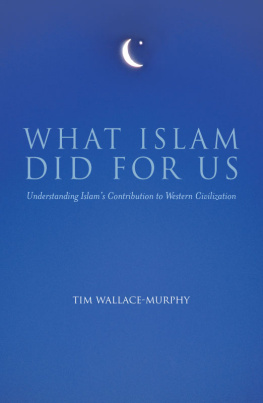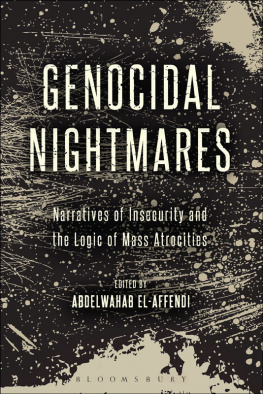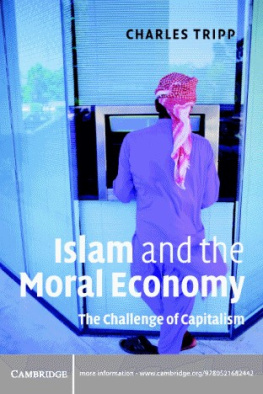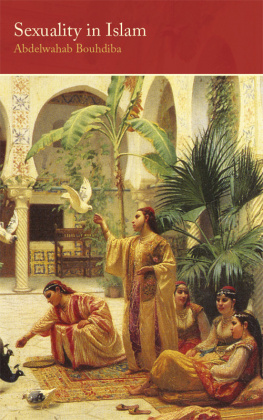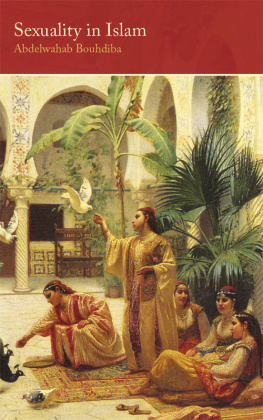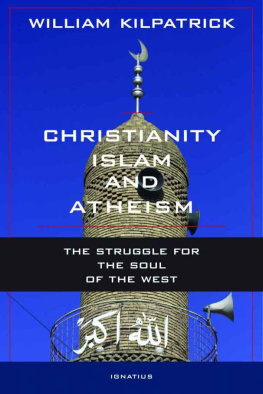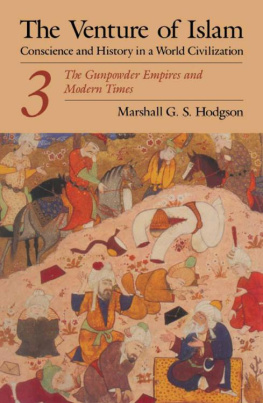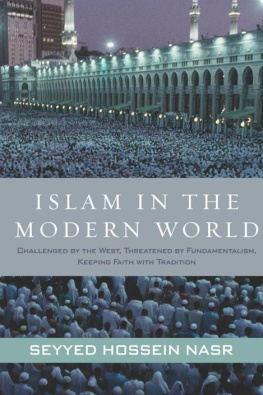Meddeb Abdelwahab - Islam and the Challenge of Civilization
Here you can read online Meddeb Abdelwahab - Islam and the Challenge of Civilization full text of the book (entire story) in english for free. Download pdf and epub, get meaning, cover and reviews about this ebook. publisher: Fordham University Press, genre: Religion. Description of the work, (preface) as well as reviews are available. Best literature library LitArk.com created for fans of good reading and offers a wide selection of genres:
Romance novel
Science fiction
Adventure
Detective
Science
History
Home and family
Prose
Art
Politics
Computer
Non-fiction
Religion
Business
Children
Humor
Choose a favorite category and find really read worthwhile books. Enjoy immersion in the world of imagination, feel the emotions of the characters or learn something new for yourself, make an fascinating discovery.

- Book:Islam and the Challenge of Civilization
- Author:
- Publisher:Fordham University Press
- Genre:
- Rating:3 / 5
- Favourites:Add to favourites
- Your mark:
- 60
- 1
- 2
- 3
- 4
- 5
Islam and the Challenge of Civilization: summary, description and annotation
We offer to read an annotation, description, summary or preface (depends on what the author of the book "Islam and the Challenge of Civilization" wrote himself). If you haven't found the necessary information about the book — write in the comments, we will try to find it.
Islam and the Challenge of Civilization — read online for free the complete book (whole text) full work
Below is the text of the book, divided by pages. System saving the place of the last page read, allows you to conveniently read the book "Islam and the Challenge of Civilization" online for free, without having to search again every time where you left off. Put a bookmark, and you can go to the page where you finished reading at any time.
Font size:
Interval:
Bookmark:
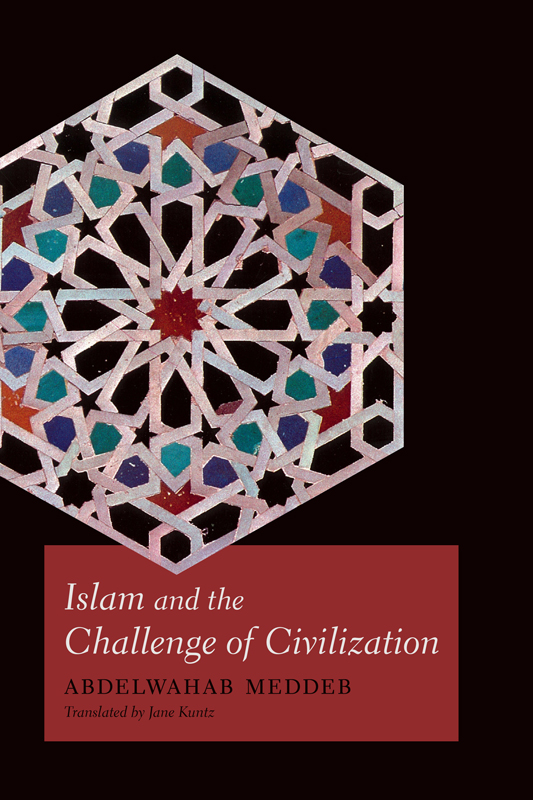
Islam and the Challenge of Civilization
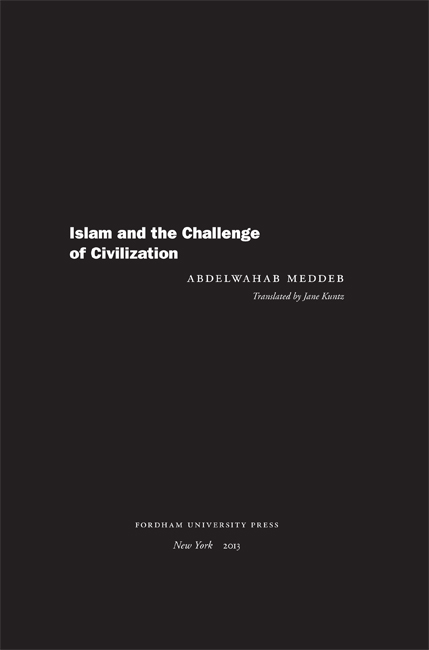
Copyright 2013 Fordham University Press
All rights reserved. No part of this publication may be reproduced, stored in a retrieval system, or transmitted in any form or by any meanselectronic, mechanical, photocopy, recording, or any otherexcept for brief quotations in printed reviews, without the prior permission of the publisher.
This work was originally published in French as Pari de civilisation , ditions du Seuil, 2009.
Cet ouvrage a bnefici du soutien des Programmes daide la publication de lInstitut Franais.
This work, published as part of a program of aid for publication, received support from the Institut Franais.
Ouvrage publi avec le concours du Ministre franais charg de la CultureCentre National du Livre.
This work has been published with the assistance of the French Ministry of CultureNational Center for the Book.
Fordham University Press has no responsibility for the persistence or accuracy of URLs for external or third-party Internet websites referred to in this publication and does not guarantee that any content on such websites is, or will remain, accurate or appropriate.
Fordham University Press also publishes its books in a variety of electronic formats. Some content that appears in print may not be available in electronic books.
Library of Congress Cataloging-in-Publication Data
Meddeb, Abdelwahab.
Islam and the challenge of civilization / Abdelwahab Meddeb ; translated by Jane Kuntz.
p. cm.
Includes bibliographical references.
1. Islam21st century. 2. Islamic civilization. 3. MuslimsNon-Muslim countries. 4. Islamic renewal. I. Kuntz, Jane. II. Title.
BP161.3.M43 2013
297.2'709051dc23
2012050168
Printed in the United States of America
15 14 13 5 4 3 2 1
First edition
Contents
Appendixes
A.
B.
All is not well with Islam. In fact, it is seriously ailing. I have ventured to diagnose this ailment and to prescribe the cure in four previous books written since the horrendous attacks of September 11, 2001. This new work is an extension of the scrutiny undertaken in those earlier ones. I open with a reminder that this ailment can be best summed up as the use of violence in the name of God. I will pursue this point of inquiry, asking whether it is somehow a fate peculiar to Islam, or whether we are dealing here with a structural feature shared by religious constructions in general.
I posit from the outset that violence produced by belief is not unique to Islam but finds virulent expression even among beliefs issuing from the Indian subcontinent, a region stereotypically associated with a spirituality grounded in the miracle of nonviolence. Thus, an apparent predisposition to violence is in evidence beyond the sphere of monotheisms, whose internal conflict, need I point out, is itself fratricidal by nature.
One has only to survey monotheisms over space and time to note that wars fought in the name of the Lord were biblical before they were Koranic. One typical illustration would be the massacre ordered by an angry Moses upon discovering that his people had lapsed into paganism. As a result of the Golden Calf episode, the Levites carried out the orders of their prophet and slaughtered three thousand people in one day (Exodus 32:28). Joshua, successor to the founder, was no exception. If readers need convincing, I would urge them to reread the passage relating to the massacre he perpetrated after the fall of Jericho, where he spared neither man, woman, nor child, nor even animals (Joshua 6:21). Today, certain fanatical Jewish literalists are seeking to universalize and contemporize what they call the Judgment of Amalek, which refers to the chief of the Amalekites, whom the Hebrews had to combat, because they were preventing the Hebrews from getting to the Promised Land (Exodus 17:815).
Thus, when it comes to violence, the Prophet of Islam is a direct descendant of the Old Testament. The much-discussed Verse of the Sword ordaining that pagans be killed and the War Verse calling for a fight to the death against Christians and Jews both have a biblical ring (Koran 9:5, 29). Yet it is these verses that feed the murderous fanaticism of fundamentalist Muslims.
If the exercise of violence seems consistent with revealed scripture, nevertheless an important matter of degree distinguishes Judaism from Islam, which is that the latter universalizes what the former particularizes. Where Judaism wages the Lords war for the Holy Land only, Islam sets its sights on the entire world. Contemporary Muslim fundamentalists did not invent jihd , the driving force that propelled the expansion of Islam from the start. As an eleventh-century Chinese chronicler, Ou-Yang Hsui, attests, Muslim troops hurled themselves into the thick of battle, hoping for martyrdom, after their chief had galvanized them with promises of paradise for those who die in combat for the holy cause.
Though it is true that the Gospels move away from this violence, Christians have nonetheless resorted to surprising extremes of violence over the course of history. I see in this a betrayal of Christianitys founding message. Admittedly, Augustine theorized the just war to defend the city against barbarian invasion. He was not talking about a call to war in the name of the faith, but the Doctor of Hippo had to legitimize that call even though he knew it conflicted with the spirit of the Gospels. The notion of a just war has often been contested in Christian circles, where it is considered to be in direct contradiction with Christs teachings. Hence, to justify the use of violence, the notion of necessary war was introduced. Yet it took nearly a millennium and the launching of the Crusades for Christianity to arrive at a notion equivalent to jihd , perhaps to counter its effects using the same weapons.
These reminders are not intended to mitigate the malady that is afflicting Islam, but to show that believers often take their founding scriptures a step further, or even move beyond them altogether. If, throughout history, Christianity has not always honored the Gospels message of peace, Islam today should still strive to find a way to foil those clauses of the Koranic text that call for war. This book works toward that goal by waging what I call the war of interpretations, while placing special emphasis on the context in which the holy text itself was issued and received.
This check on violence via the return to context is absolutely crucial, with regard not only to the question of violence but also to the many anthropological anachronisms carried forward by the law that issues from the spirit and the letter of the founding text (here, of course, I am thinking of the Koran-inspired shara ).
Again, with regard to violence, states founded in Islam will need to realize that it is their duty to counteract the notion of holy war, of jihd , for it flagrantly contradicts both their participation in the concert of nations and the march toward the Kantian utopia of perpetual peace that has remained an aspiration of the times, despite the persistence of war and the hegemonic effects of the powerful, with their urge to rule the world. Indeed, an ever more diverse sample of humanity is trending toward hegemony by force of arms or economic clout. Is this not the aim of emerging nations such as China, India, and the Arab oil states alongside Europe and the United States?
Islamic countries must wake up to the fact that times have changed, that the world is a different place. When it comes to religious identity, Islam continues to perceive Christianity as if it were still its medieval antagonist, despite modern notions of nation and peoples that have circumscribed the influence of religion. And now that the whole issue of state has become postnational, the factor of religion is receding even further. In Europe, for example, religion necessarily cedes priority to the all-important prime notion of citizenship, one that involves a wholly different set of laws designed outside the kind of religious prescription that belongs to another age.
Font size:
Interval:
Bookmark:
Similar books «Islam and the Challenge of Civilization»
Look at similar books to Islam and the Challenge of Civilization. We have selected literature similar in name and meaning in the hope of providing readers with more options to find new, interesting, not yet read works.
Discussion, reviews of the book Islam and the Challenge of Civilization and just readers' own opinions. Leave your comments, write what you think about the work, its meaning or the main characters. Specify what exactly you liked and what you didn't like, and why you think so.

